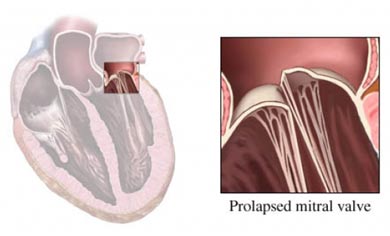Mitral valve prolapse – Mitral valve prolapse – Barlow Syndrome
Description of mitral valve
Mitral valve prolapse (PMK) is widespread, usually, benign violation of cardiac activity. The mitral valve controls blood flow between the top (Atrium) and bottom (ventricle) Chambers on the left side of the heart. Usually, blood should flow in one direction only, from the upper Chamber in the lower. While PMK valve not working properly, valve part sags in the Atrium, and blood can flow in the wrong direction, or come back to the Atrium.

Causes of mitral valve
In most cases the reasons for the MPC are unknown. In some cases, this, considered, a hereditary genetic condition. Rare MPC can cause:
- Rheumatic fever;
- Coronary artery disease;
- Cardiomyopathy;
- Atrial Septal defects.
Risk factors of mitral valve
Factors, increase the likelihood of mitral valve:
- Family history of mitral valve;
- Paul: female;
- Age: from 14 to 30 years;
- Scoliosis;
- Small diameter of the chest;
- Low body weight;
- Low blood pressure;
- Deformations of thorax;
- Marfan syndrome;
- Grave's disease.
Symptoms of mitral valve prolapse
People with mitral valve prolapse often have no symptoms. If symptoms are present, they may include:
- Irregular heartbeat;
- Fatigue;
- Chest pain;
- Panic attacks or anxiety;
- Cardiopalmus;
- Sensation of skipped heart beats;
- Breathlessness;
- Dizziness;
- Bowel problems (such, How irritable bowel syndrome).
Diagnosis of mitral valve prolapse
Prolabirovanie cusps of the mitral valve can be heard through a stethoscope. Little blood injuries will resemble a noise. When the mitral valve shutter bend back, It can be like a clicking sound. Noises and clicks – main features of PMK. An Echocardiogram may confirm the diagnosis. Maybe, will also need to wear monitor Holtera within a day or two, to make a continuous recording of electrical activity of the heart (ECG).
Treatment of prolapse of the mitral valve
In most cases, treatment is not required. Although it is possible, need to take antibiotics before certain dental and medical procedures. This is to prevent infection. Need to ask the doctor about the need to take antibiotics.
If symptoms include pain in the chest, anxiety or panic attacks, may be prescribed beta blocker medications. You should also ask your doctor, can I play sports.
In very rare cases, blood leakage may become a serious. In these few cases, the mitral valve, perhaps, should be surgically repaired or replaced.
Prevention of prolapse of the mitral valve
There are no guidelines for, to prevent MPC unknown or genetic origin.
You can prevent the symptoms of mitral valve prolapse, However, only through certain lifestyle changes:
- You want to limit your intake of caffeine;
- There is a need to avoid drugs (such as protivozastojnye tools), that speed up the heart rate;
- Engage in active sports can after consultation with a physician.
